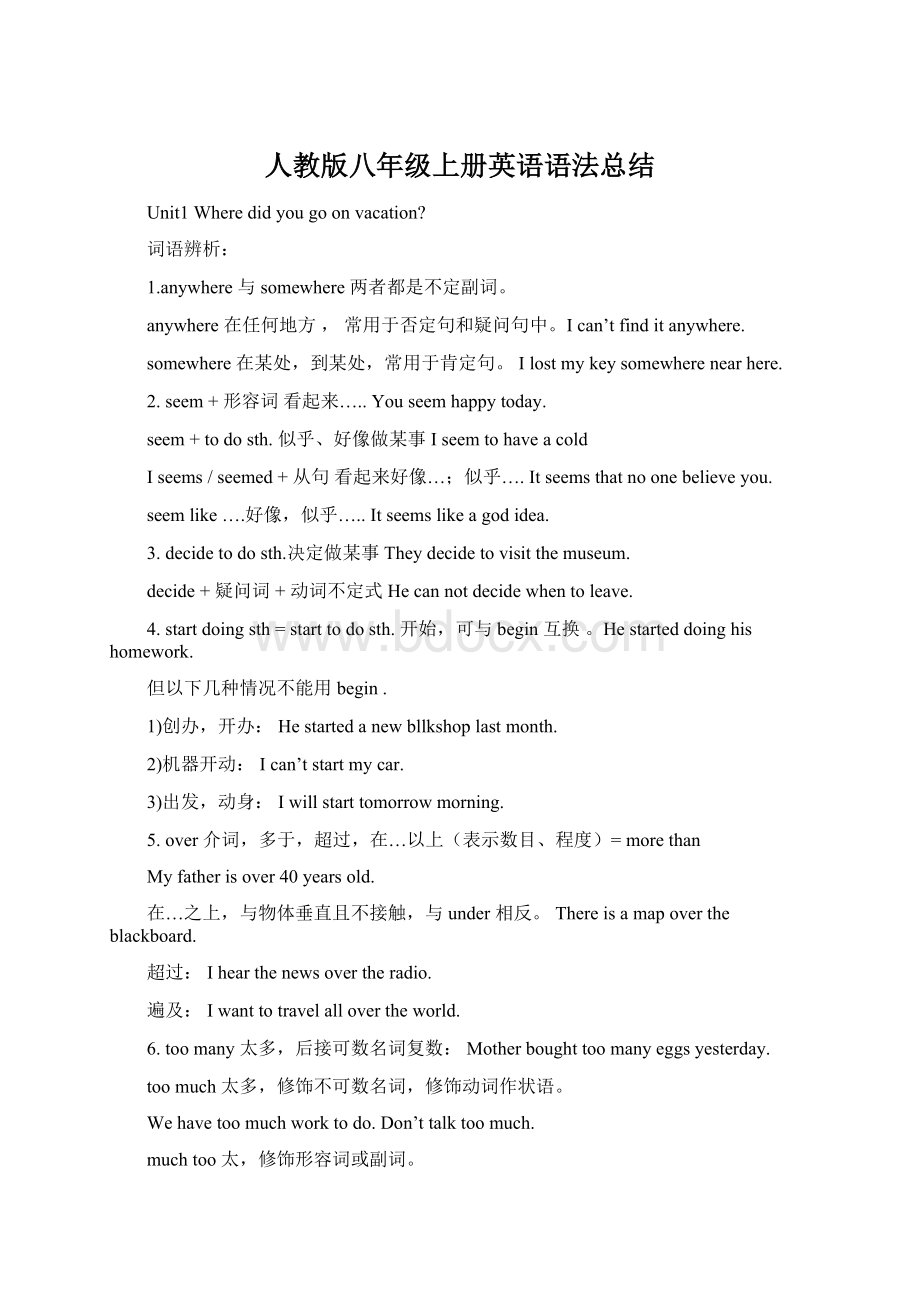 人教版八年级上册英语语法总结文档格式.docx
人教版八年级上册英语语法总结文档格式.docx
- 文档编号:20815654
- 上传时间:2023-01-25
- 格式:DOCX
- 页数:15
- 大小:32.75KB
人教版八年级上册英语语法总结文档格式.docx
《人教版八年级上册英语语法总结文档格式.docx》由会员分享,可在线阅读,更多相关《人教版八年级上册英语语法总结文档格式.docx(15页珍藏版)》请在冰豆网上搜索。

Motherboughttoomanyeggsyesterday.
toomuch太多,修饰不可数名词,修饰动词作状语。
Wehavetoomuchworktodo.Don’ttalktoomuch.
muchtoo太,修饰形容词或副词。
Thehatismuchtoobigforme.You’rewalkingmuchtoofast.
分辨三者的口诀:
toomuch,muchtoo,用法区别看后头:
much后接不可数,too后修饰形或副。
toomany要记住,后面名词必复数。
7.becauseof介词短语,因为,由于,后接名词、代词或动名词,不能接句子。
Hecan’ttakeawalkbecauseoftherain.
because连词,因为,引导状语从句,表示直接明确的原因或理由。
Idon’tbuytheshirtbecauseitwastooexpensive.
Unit2Howoftendoyouexercise?
1.howoften多久一次,用来提问动作发生的频率。
回答用:
once,twice,threetimes等词语。
Howoftendoyouplaysports?
Threetimesaweek.
howlong多长,用来询问多长时间,也可询问某物有多长。
HowlongdoesittaketogettoShanghaifromhere?
Howlongistheruler?
howfor多远,用来询问距离,指路程的远近。
Howfarisitfromheretothepark?
It’sabout2kilometers.
2.free空闲的,有空的,反义词为busy.befree有空,闲着,相当于havetime.
I’llbefreenextweek.=I’llhavetimenextweek.
还可作“免费的、自由的”解。
befreetodosth.自由地做某事。
Theticketsarefree.You’refreetogoortostay.
3.Howcome?
怎么会?
怎么回事?
表示某件事情很奇怪,有点想不通;
可单独使用,也可引导一个问句,相当于疑问句why,但howcome开头的特殊疑问句使用的仍然是陈述语序。
HowcomeTomdidn’tcometotheparty?
=Whydidn’tTomcometotheparty?
4.stayuplate指“熬夜到很晚,迟睡”。
Don’tstayuplatenexttime.
stayup指“熬夜,不睡觉”。
Hestayedupallnighttowritehisstory.
5.gotobed强调“上床睡觉”的动作及过程,但人不一定睡着。
Iwenttobedatelevenlastnight.
gotosleep强调“入睡,睡着,进入梦乡”。
Shewassotiredthatshewenttosleepsoon.
6.find+宾语+名词,发现:
Wehavefoundhim(tobe)agoodboy.
find+宾语+形容词,发现:
Hefoundtheroomdirty.
find+宾语+现在分词,发现:
Ifoundherstandingatthedoor.
7.percent百分数,基数词+percent:
percent没有复数形式,作主语时,根据所修饰的名词来判断谓语的单复数。
Fortypercentofthestudentsinourclassaregirls.Thirtypercentoftimepassed.
8.morethan超过,多于,不仅仅,相当于over.在句型转换中考查两者的同义替换。
反义词组为:
lessthan.
IlivedinShanghaiformorethan/overtenyears.
9.afraid形容词,担心的,害怕的,在句中作表语,不用在名词前作定语。
I’mafraidwecan’tcomehereontime.
beafraidofsb/sth害怕某人/某事;
beafraidofdoingsth.害怕做某事。
Somechildrenareafraidofthedark.Don’tbeafraidofaskingquestion.
I’mafraid+从句(恐怕,担心):
I’mafraidIhavetogonow.
10.sometimes,sometime,sometimes,sometime的区别:
sometimes频度副词,有时。
表示动作发生的不经常性,多与一般现在时连用,可位于句首、句中或句末。
SometimesIgetupveryearly.------Howoftendoyougetup?
sometime副词,某个时候。
表示不确切或不具体的时间,常用于过去时或将来时,对它用疑问词when.
IwillgotoShanghaisometimenextweek.------WhenwillyougotoShanghainextweek?
sometimes名词词组,几次,几倍。
其中time是可数名词,对它提问用howmanytimes.
Ihavereadthestorysometimes.-------Howmanytimeshaveyoureadthestory?
sometime名词短语,一段时间.表示“一段时间”时,句中谓语动词常为延续性动词,提问时用Howlong.
I‘llstayhereforsometime.-----Howlongwillyoustayhere?
Unit3I’mmoreoutgoingthanmysister
laughv.&
n.笑
Wealllaughedloudlywhenshemadeajoke.她说了个笑话,我们都大声笑起来。
Wealllaughedathisjoke.听了他的笑话我们都笑起来。
Helaughsbestwholaughslast.谁笑在最后,谁笑得最好。
/不要高兴得太早。
(与at连用)嘲笑
Don’tlaughathim.别嘲笑他。
Peoplehaveoftenlaughedatstoriestoldbyseamen.人们常常嘲笑海员所讲的故事。
Everyonelaughedathisfoolishantics.大家都笑他那种愚蠢的滑稽动作。
笑;
笑声Wehadagoodlaughathisjoke.我们被他的笑话逗得哈哈大笑。
thoughconj.虽然;
纵然;
即使;
尽管=although
Thoughitwasraining,hewentthere.虽然当时正下着雨,他还是到那里去了。
Thoughhewaspoorhewashappy.虽然他很穷却很快乐。
注意:
不能受汉语的影响,在though引导的从句后使用but。
如:
Thoughhewaspoor,buthewashappy.(误)
thoughadv..不过,可是,然而,常用于句末,用逗号隔开。
Jimsaidthathewouldcome,hedidn’t,though.
语法讲解:
形容词与副词的比较级
大多数形容词(性质形容词)和副词有比较级和最高级的变化,即原级、比较级和最高级,用来表示事物的等级差别。
原级即形容词的原形,比较级和最高级有规则变化和不规则变化两种。
1.规则变化
单音节词和少数双音节词,加词尾-er,-est来构成比较级和最高级。
构成法
原级
比较级
最高级
一般单音节词末尾加-er,-est
tall(高的)
great(巨大的)
taller
greater
tallest
greatest
以不发音的e结尾的单音节词和少数以-le结尾的双音节
词只加-r,-st
nice(好的)
large(大的)
nicer
larger
nicest
largest
以一个辅音字母结尾的闭音节单音节词,双写结尾的辅
音字母,再加-er,-est
big(大的)
hot(热的)
bigger
hotter
biggest
hottest
“以辅音字母+y”结尾的双音节词,改y为i,再加-er,
-est
easy(容易的)
busy(忙的)
easier
busier
easiest
busiest
少数以-er,-ow结尾的双音节词末尾加-er,-est
clever(聪明的)
narrow(窄的)
cleverer
narrower
cleverest
narrowest
其他双音节词和多音节词,在前面加more,most来构成比较级和最高级
important(重要的)
easily(容易地)
moreimportant
moreeasily
mostimportant
mosteasily
2.不规则变化
good(好的)well(健康的)
better
best
bad(坏的)ill(有病的)
worse
worst
old(老的)
older/elder
oldest/eldest
much/many(多的)
more
most
little(少的)
less
least
far(远的)
farther/further
farthest/furthest
Unit4What’sthebestmovietheater
句型:
1.Ithasthebiggestscreens.
2.TheDJschoosesongsthemostcarefuuly.
3.Howdoyoulikeitsofar?
到目前为止,你认为它怎么样?
4.Thanksforgettellingme.
5.CanIaskyousomequestions?
常用法:
CanIaskyousome…….
Howdoyoulike…….你认为……怎么样
Thanksfordoingsth.
Whatdoyouthinkof……..
much+形容词或副词比较级…….得多
watchsb.dosth.观看某人做某事
playaroleindoingsth.发挥做某事的作用
oneof+可数名词复数…..之一……
Unit5Doyouwanttoagameshow?
----Whatdoyouthinkoftalkshows?
----Idon’tmindthem.
IhopetobeaTVreporteroneday.
Howaboutyou?
letsb.dosth.plantodosth.
hopetodosth.happentodosth.
expecttodosth.Howaboutdoing……
bereadytodosth.tryone’sbesttodosth.
知识点:
1、theother,theothers,other,others,another辨析
theother表示特指两个或者两部份中的另一个或另一部分,可直接单数名词或复数名词。
表示两个中的一个……另一个……时,常用one…theother…。
例:
Hehastwobrothers,oneisateacher,theotherisadoctor.
Therearefortystudentsinourclass.twenty-onearegirls,theothernineteenareboys.
theothers特指某一范围内的其他的(人或物),是theother的复数形式,相当于theother+复数名词。
theother+复数名词=anyother+名词单数。
Youtwostayhere,theothersgowithme.
I’mdifferentfromJeffbecauseI’mlouderthantheotherkids(anyotherkid)inmyclass.
other作代词或形容词,可修饰可数名词单数或复数。
WelearnChinese,Maths,Englishandothersubjects.
others作代词,泛指“其他的人或物”。
例:
Somestudentsaredoinghomework,othersaretalkingloudly.
another泛指同类事物中的三者或三者以上的“另一个”,只能代替或修饰单数可数名词。
Idon’tlikethisone.Pleaseshowmeanotherone.
2.findout查明,弄清楚,find找到
PleasefindoutwhenMrsGreenwillgotoBeijing.
3、goon发生,与takeplace同义
Iwonderwhatwasgoingon.
4、happenv.发生,一般指偶然发生,主语为事,不能为人。
Sth+happenstosb.Atrafficaccidenthappenedtohiselderbrotheryesterday.
Sth+happens+地点/时间,意为:
某地/某时发生了某事
AnaccidenthappenedonParkStreet.
happenv,表示“碰巧”,主语可以是人,后常跟动词不定式to,表示“碰巧……”.
Sb+happenstodosth.
Ihappenedtoseemyuncleonthestreet.
*takeplace意为“发生,举行,举办”,一般指非偶然性事件的“发生”,即这种事件的发生一定有某种原因或事先的安排。
GreatchangeshavetakenplaceinChina.
ThemeetingwilltakeplacenextFriday.
5、expectv.期待,盼望,预期,后常接四种结构:
1)expect+名词/代词,期待某事/某人,预计……可能发生。
I’mexpectingLiLin’sletter.
2)expecttodosth.预计做某事
Lilyexpectstocomebacknextweek.
3)expectsb.todosth.
Iexpectmymothertocomebackearly.
4)expect+从句预计……
IexpectedthatI’llcomebacknextMonday.
6、seriousa.严肃的,认真的。
Heisaseriousman.
beseriousaboutsb/sth.对某人/某事当真
PeterisseriousaboutJenny.Hewantstogetmarriedtoher.
beseriousaboutdoingsth.对某事当真____He’sseriousaboutsellinghishouse.
Unit6I’mgoingtostudycomputerscience
短语用法:
wanttodosth.begoingto+动词原形
practicedoingsth.keepondoingsth.
learntodosth.finishdoingsth
promisetodosth.helpsb.todosth.
remembertodosth.agreetodosth.
lovetodosth.
begoingto的用法
1)begoingto+动词原形——表示将来的打算、计划或安排。
常与表示将来的tomorrow,nextyear等时间状语或when引导的时间状语从句连用。
各种句式变换都借助be动词完成,be随主语有am,is,are的变换,goingto后接动词原形。
肯定句:
主语+begoingto+动词原形+其他。
Heisgoingtotakethebusthere.
否定句:
主语+benotgoingto+动词原形+其他I’mnotgoingtoseemyfriendsthisweekend.
一般疑问句:
Be+主语+goingto+动词原形+其他
肯定回答:
Yes,主语+be.否定回答:
No,主语+benot.
Areyougoingtoseeyourfriendsthisweekend?
Yes,Iam./No,I’mnot.
特殊疑问句:
疑问词+be+主语+goingto+动词原形+其他?
Whatishegoingtodothisweekend?
Whenareyougoingtoseeyourfriends?
2)如果表示计划去某地,可直接用begoingto+地点
WearegoingtoBeijingforaholiday.
3)表示位置移动的动词,如go,come,leave等常用进行时表示将来。
Thebusiscoming.MyauntisleavingforBeijingnextweek.
4)begoingto与will的区别:
对未来事情的预测用“will+动词原形”表达,will没有人称和数的变化,变否定句要在will后面加not,也可用will后面加not,或者缩略式won’t,变一般疑问句将will提至句首。
Willplanesbelargeinthefuture?
Yes,theywill./No,theywon’t.
will常表示说话人相信或希望要发生的事情,而begoingto指某事肯定发生,常表示事情很快就要发生。
IbelieveLucywillbeagreatdoctor.
陈述将来的某个事实用will.
Iwilltenyearsoldnextyear.
表示现在巨大将来要做的事情用will.
I’mtiredIwillgotobed.
表示意愿用will.
I’lltellyouthetruth.
表示计划、打算要做的事情用begoingto,而不用will.
I’mgoingtobuyacomputerthismonth.
2、promisevt.保证,许诺。
有三种结构:
1)promisetodosth._____Mymotherpromisedtobuyapianoforme.
2)promisesb.sth._____Myauntpromisedmeabike.
3)promise+that从句_____Tompromisesthathecanreturnontime
- 配套讲稿:
如PPT文件的首页显示word图标,表示该PPT已包含配套word讲稿。双击word图标可打开word文档。
- 特殊限制:
部分文档作品中含有的国旗、国徽等图片,仅作为作品整体效果示例展示,禁止商用。设计者仅对作品中独创性部分享有著作权。
- 关 键 词:
- 人教版八 年级 上册 英语语法 总结
 冰豆网所有资源均是用户自行上传分享,仅供网友学习交流,未经上传用户书面授权,请勿作他用。
冰豆网所有资源均是用户自行上传分享,仅供网友学习交流,未经上传用户书面授权,请勿作他用。


 铝散热器项目年度预算报告.docx
铝散热器项目年度预算报告.docx
